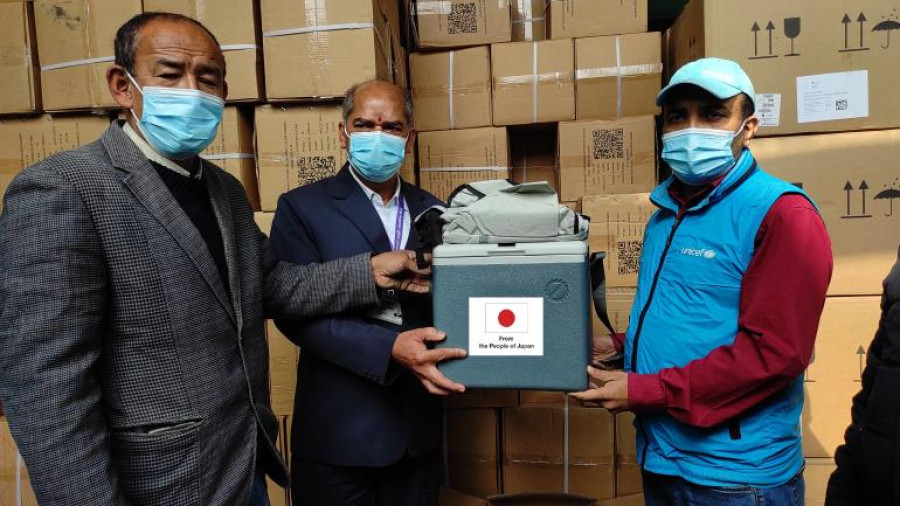Health
Japan provides aid to Nepal to strengthen vaccine cold chain system
New equipment will help expedite vaccination campaigns and broaden the scope of inoculation in remote areas.
Post Report
Japan has provided grant assistance to strengthen the vaccine cold chain system in Nepal through the United Nations Children’s Fund (UNICEF).
The vaccine cold chain systems include proper storage facilities such as cold rooms, refrigerators, freezers in vaccine storage facilities, refrigerator containers for transportation, cold boxes, among other supportive equipment.
Under its grant, Japan has provided nine walk-in-coolers, 38 solar-driven vaccine refrigerators, 1,109 long-range vaccine carriers and 53 cold boxes to ensure proper storage, management and transportation of Covid-19 vaccines in Nepal.
These equipment have been delivered sequentially throughout Nepal since last year and the delivery of all items was completed on January 30 this year. Along with providing support to human resource development for the operation and maintenance of cold chain equipment, the grant also reinforces monitoring efforts for effective management of routine and Covid-19 vaccines by UNICEF.
“Nepal is currently experiencing the third wave of Covid-19 with the Omicron variant, which makes the vaccine drive one of the top priorities for the Government of Nepal,” said Ambassador of Japan to Nepal, Kikuta Yutaka, in a press statement released by UNICEF on Monday.
“Proper vaccine storage is crucial in the vaccine campaign and this grant aims to drastically increase the capacity for storage and distribution of vaccines across the country,” reads the statement.
The walk-in-coolers are reportedly said to be transportable and can be installed relatively quickly and inexpensively; the solar-driven refrigerators help tackle storage issues faced by regions with interrupted electricity supply, and the carriers and boxes enable vaccine distribution to communities inaccessible by vehicles.
“I hope this grant can expedite the process in reaching every person waiting for the vaccine, and I sincerely hope the people of Nepal to regain normal, safe days, overcoming the challenges of Covid-19 pandemic as soon as possible,” said Kikuta.
Japan has so far donated vaccines, ambulances, various medical and cold chain equipment to strengthen the measures against Covid-19. Additionally, it recently decided to extend loan assistance of up to 10 billion Japanese yen to the Nepal government for economic recovery, growth and social resilience.
“We are grateful to the Government of Japan for its continued support to Nepal in critical efforts to safely and effectively deliver and store vaccines across the country, particularly at a time when Nepal is battling high numbers of Covid-19 infections during the current wave,” said Elke Wisch, UNICEF Representative in Nepal. “The cold chain equipment provided through Japan’s generous support will not only support Nepal’s current Covid-19 vaccination drive, but also reinforce critical routine immunisation services to protect children against main childhood diseases. A strengthened vaccination system will further contribute to ensuring that the health system is robust enough in case of future crises so that children, families, and communities across Nepal can be protected.”
UNICEF has been working for years with the Nepal government as partners to strengthen the country’s vaccine cold chain systems for routine immunisation.
After the onset of Covid-19, UNICEF has been providing technical assistance to the government of Nepal to strengthen in-country supply chains systems and to ensure that adequate cold chain capacity is in place to accommodate Covid-19 vaccines. It has also been supplying syringes, developing a Covid-19 vaccination rollout guideline, training health workers, and working with communities in addressing misinformation and building trust in vaccines.




 11.84°C Kathmandu
11.84°C Kathmandu














